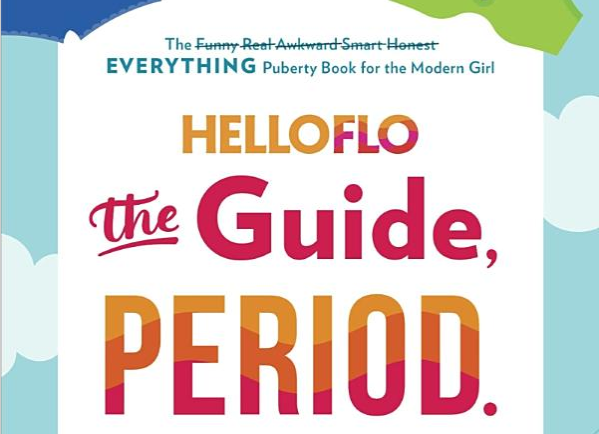Many moms remember their own "period talk" as the mortifying moment when your mom (or maybe the gym teacher) gave you some pads and told you that one day you'd bleed into your underwear. Yikes. Unless you were really lucky, that's pretty much all we got. Anything else related to womanhood and sex was whispered about or found in the pages of banned books we passed under our desks.
Naama Bloom thinks women may be mysterious creatures, but our periods and changing bodies don't have to be. She believes the time has come for adults to clue girls in on everything there is to know about puberty and periods. We checked out her new book Hello Flo: The Guide, Period and caught up with the author for some girl talk on how to tackle the most tricky (and awkward) puberty topics with our own daughters.

More from CafeMom: This Ikea Family Photo Shoot is What Dreams Are Made of
I'll be the first to admit that I'd love to wait until my kids come to me with questions about their changing bodies. But Bloom says the trick to raising girls who are comfortable and confident in their skin is starting the dialogue yourself rather than waiting for your daughter to take the lead. And the conversations you need to have should be happening long before Aunt Flo arrives.
The Pre-Puberty Body Talk
When is the best time to start talking about puberty? "It’s definitely a lot sooner than most parents think," Bloom explains. "There are age-appropriate approaches to talking to kids as young as preschool about what’s going on."
There's no need to tell them the details of sex at that age, but kids will want to know about their bodies and how they change as they grow. "You can start with basics like how girls and boys turn into women and men and that process begins around 10 or 12. If you answer in a matter of fact tone, they usually just absorb the information and move on."
The "Dad Knows This Stuff Too" Talk
Bloom says there's no reason dads should get a free pass on the puberty talks just because they happen to have a daughter instead of a son. "Every time a dad says, 'Ew, talk to your mother about that!' that creates shame and stigma around women’s health when there doesn’t need to be," Bloom says.
"Obviously dads can’t speak from personal experience, but it’s nice when a father isn’t cringing if his middle school daughter asks him to pick up a box of tampons at the drugstore. Those small actions makes a difference."
We totally agree. We'll take a pint of double chocolate chip too, please.
Embedded content: https://media.giphy.com/media/l4JzdRPCNEwP1dbTW/giphy.gif
The TMI Menstruation Talk
When you do talk to your daughter about her period, Bloom reminds us to tell her that menstrual blood doesn't always look like the blood you see in scary movies. "Many girls are often mistake it for a poop stain," she says.
And while we don't want to scare them, it's important to let them know what cramps feel like, if only so they don't worry that there's something seriously wrong with them when their periods strike. "Many moms have had their periods for several years or decades," Bloom reminds us, "so it’s easy to forget how much you didn’t know when you were young."
More from CafeMom: Stay-at-Home Mom Finds Out What Her Salary Could Have Been & Her Response Is Perfect
The Vaginal Discharge Info Session
While many moms are great about talking to their daughters about their periods, a lot of us forget to mention that vaginas are known for dropping other surprises into our underwear all month long, which can scare and confuse girls who aren't expecting it. "When it comes to vaginal discharge, moms should relay that having clearish fluid in your underpants is completely normal and actually shows that your body is working properly," says Bloom.
Your daughter might turn 50 shades of red when you bring this up, but it's important to remind her that monitoring the smell of her vaginal discharge is a way to make sure she's staying healthy. "They should also explain that if that discharge isn’t a thinner, clearish fluid with little smell (i.e. it has a fishy odor or it’s thick like cottage cheese) or if there seems to be a lot of it, it’s time to speak up and potentially see a medical professional," explains Bloom.
Embedded content: https://media.giphy.com/media/1DfdCZ4X6eDCw/giphy.gif
The "It's Okay to Embrace Your Changing Body" Talk
It's not always easy to admit our daughters are becoming women. But when it comes to buying bras, Bloom says moms shouldn't necessarily freak out if their daughter heads straight to the lace and pushup options. "I think the most important thing parents can do is give their daughters agency," she suggests. "If she’s buying these types of bras because she feels like she 'has to' or that those are the only options, it’s important to reassure her that that isn’t in fact the case," says Bloom. "If she’s buying them because she genuinely feels her best wearing them, she should have that option."
More from CafeMom: Baby Showers for Grandma are a Thing & My Mom Totally Wants One
The Mental Health Talk
Finally, Bloom reminds parents that while we all know the stereotype of the moody tween and teen, it's crucial to talk to our girls about the difference between typical teen mood swings and actual mental illness. "If your daughter has her own concerns or you notice that her symptoms aren’t going away or are getting more severe (for instance, she feels like she can’t physically get out of bed for several days), talk to her about how she’s feeling, withhold judgment, and consider seeing a medical professional."




